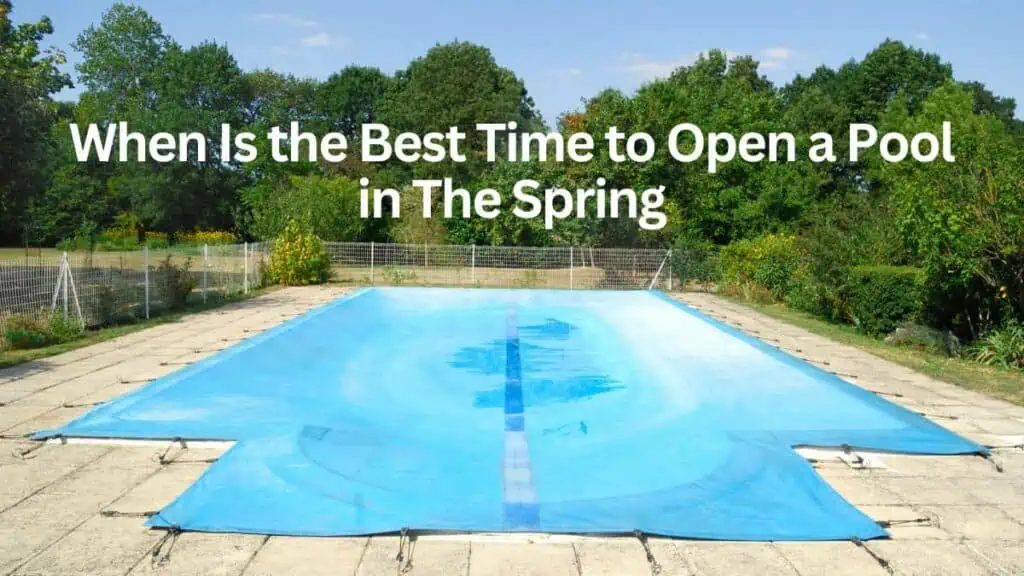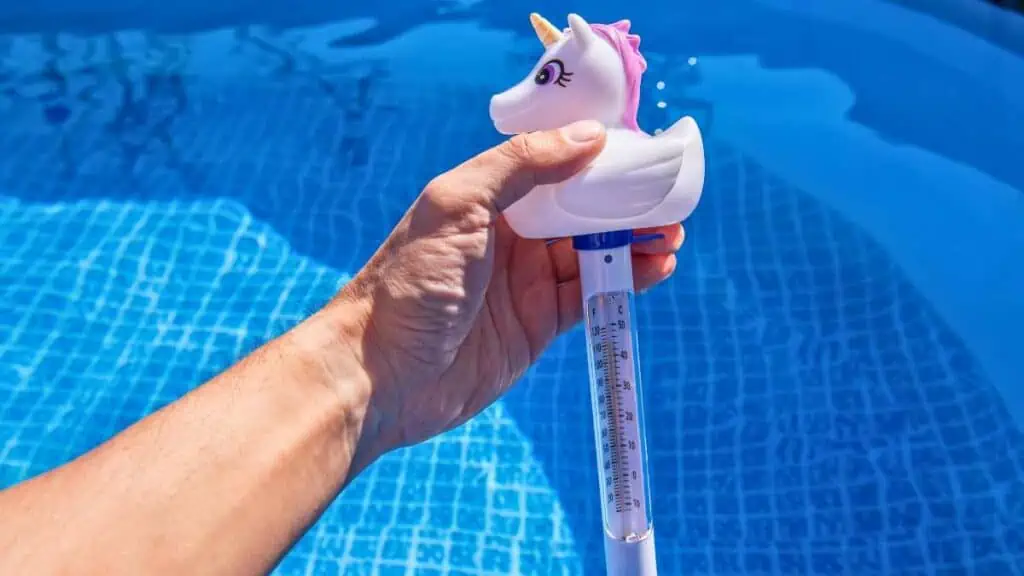As a pool owner, you eagerly anticipate the warmer months when you can enjoy a refreshing swim.
But do you know the ideal time to open your pool for the season? The answer depends on various factors, such as the climate in your region and your personal preferences.
Generally, it’s recommended that you open your pool when daily high temperatures are consistently above 65-70ºF.
Understanding when to open your pool can help prevent algae growth and ensure a pleasant swimming experience. In most regions, this typically occurs in late spring or early summer, around May or June, but in southern areas, it could be in early April.
As I live in a reasonably warm area, I normally open my pool in late April to mid-May, depending on the weather.
By being mindful of local weather patterns, you can determine the best time to get your pool ready for use, considering factors like pollen levels and water temperature.

When Is the Best Time to Open Your Pool
Finding the right time to open your pool is crucial for maintaining its cleanliness, preventing algae growth, and ensuring a comfortable swimming environment. As a pool owner, you should know the factors determining the ideal time for pool opening.
First, the outdoor temperature plays a significant role in deciding when to open your pool. Ideally, you’ll want to open your pool when the average daily temperature reaches 70 degrees.
This helps prevent algae growth, which tends to flourish when the water temperature reaches 60 degrees or above. Monitoring the outdoor temperature can indicate when to remove your pool cover.
Geographical location also affects the ideal time to open your pool.
- If you live in a warmer region like Florida, Hawaii, Texas, or California, you may have the luxury of keeping your pool open year-round.
- However, pool owners in colder regions such as the Pacific Northwest, New England, Canada and Alaska will have a shorter pool season, sometimes lasting only two months.
Opening Pool in Early Spring

In early spring, it’s time to start thinking about opening your pool for the season. As the temperature rises consistently above 70 degrees during the day, you’ll want to take advantage of the warm weather and enjoy your pool.
This section will discuss the benefits of early opening and how warm temperatures can lead to a more enjoyable swimming season.
Benefits of Early Opening
Opening your pool in early spring has numerous advantages:
- Preventing Algae Growth: Warmer temperatures can encourage algae growth in your pool. Opening the pool early can prevent algae from proliferating and maintain a healthier pool environment.
- Reduce Maintenance Time: Starting the pool care process early means having more time to address any issues or necessary repairs. This allows you to maintain your pool throughout the swimming season with less stress and effort.
- Longer Swim Season: An early opening extends the swimming season, giving you and your family more time to enjoy your pool.
- Pollen Control: Opening your pool early can help prevent pollen from collecting in the water, making it more comfortable for swimmers.
As you can see, opening your pool in early spring has several benefits that can enhance your overall pool experience.
By embracing the warm temperatures and opting for an early opening, you can ensure a cleaner and more enjoyable swimming season for you and your loved ones.
Memorial Day Pool Opening

Memorial Day weekend is the traditional kick-off to the summer season, with many swimming pool openings, backyard barbecues, and get-togethers.
As you prepare to open your pool for your Memorial Day pool party, here are a few friendly tips to ensure a smooth and safe start.
Preparing for Opening: Before the big weekend, inspect your pool carefully. Look for any damages or maintenance that may be needed and address them in advance. Also, clean and declutter the pool area and have your pool supplies ready.
Create Pool Rules: With friends, family, and neighbors possibly enjoying your pool during Memorial Day weekend, it’s crucial to establish and post pool rules to keep everyone safe. Consider including guidelines about running, diving, and adult supervision for children.
Balancing the Water: Test and rebalance your pool’s water at least a day before gathering. This allows enough time to treat the water and let the chemicals disperse, ensuring your guests a safe and enjoyable swimming experience.
National Pool Opening Day: Consider participating in National Pool Opening Day, which encourages pool owners to open their pools earlier and avoid the rush of Memorial Day weekend. This helps ensure a proper pool opening and gives you ample time to address potential issues without the added pressure of a looming holiday deadline.
Role of Weather in Pool Opening
As the weather gets warmer, you might be itching to open your pool and dive into the refreshing water. However, various weather-related factors must be considered to determine the optimal time for pool opening.
In warmer climates like the southern states, pools often open earlier in the year due to their consistently high daytime temperatures. In these regions, it’s most suitable to open your pool when outdoor temperatures consistently surpass 70 degrees Fahrenheit. Maintaining this temperature helps prevent algae growth and keeps pollen from accumulating in the water.

Water temperature also plays a crucial role in determining your pool opening time. It is recommended that you open your pool before the water temperature reaches 60 degrees Fahrenheit. Allowing the water to get warmer than this can create ideal conditions for algae to flourish, which may lead to additional maintenance and cleaning.
In areas with cooler climates or fluctuating temperatures, you should closely monitor daytime temperatures and wait for a consistent pattern of warmer weather before opening your pool. Remember that water temperatures typically lag behind air temperatures, so you may need patience before taking the plunge.
In conclusion, the role of weather in pool opening should be carefully considered to ensure a clean, safe swimming experience. By paying attention to warmer temperatures, water temperature, and regional variations in climate, you can open your pool at the perfect time.
Do Opening Times Differ for In-Ground Pools and Above Ground Pools?
When opening your pool for the season, you might wonder if there’s a difference between inground and above ground pools. The good news is that the process and timing are fairly similar for both types of pools. The main factor to consider is the weather.
For both inground and above ground pools, it’s recommended to open the pool when daily high temperatures are consistently above 65-70ºF. Algae growth can become an issue when temperatures rise above this range. So, keep an eye on the weather conditions in your area, and aim to open your pool when consistent warm temperatures are expected.
Although inground pools may require more preparation and maintenance than above-ground pools, the overall process of opening the pool remains the same.
Remember, the sooner you open your pool, the more time you’ll have to enjoy those relaxing swims and poolside gatherings. Just be sure to monitor the weather and start the pool-opening process when temperatures are consistently above the 65-70ºF range, regardless of whether you have an inground or above ground pool.
Can You Open a Pool Earlier if You Have Heating?
If you’re a pool owner, you’re probably eager to get your pool up and running as soon as possible each season. One question often arises is whether you can open your pool earlier if you have pool heating.
The short answer is yes, but there are a few factors to consider.
A pool heater can help you open your pool earlier in the season. With a heater, you can maintain a comfortable water temperature even if the air temperature is still a bit chilly. However, it’s important to remember that opening your pool too early can have drawbacks.
One factor to consider is the condition of your pool water. If you open your pool too early, the water may still be too cold for proper chemical balance and sanitation while your heater begins to warm it up.
This can lead to algae growth and other issues that can be difficult to correct. It’s important to wait until the water temperature is consistently above 60 degrees Fahrenheit before opening your pool.
Another factor to consider is the weather. Even if you have a heater, opening your pool too early can be risky if there’s still a chance of freezing temperatures even if it is a salt water pool. If the water freezes, it can damage your pool and equipment, which can be costly to repair or replace.
Managing the Pool Water during Opening
As you begin opening your pool for the season, it’s important to manage the pool water properly. Proper water management will ensure a nice, clean swimming environment for you and your loved ones.
First, check the water level in your pool. It may have dropped during the winter months due to evaporation or leaks. If the water is below the midpoint of the skimmer opening, add water to bring it up to the appropriate level. This will help your pool’s circulation system function more efficiently.
Next, it’s time to test the pool water. Use a reliable test kit or test strips to check the chlorine, pH, alkalinity, and calcium hardness levels. Aim for these ideal ranges:
- Chlorine: 1-3 ppm
- pH: 7.4-7.6
- Alkalinity: 80-120 ppm
- Calcium Hardness: 200-400 ppm
If necessary, adjust the water chemistry by adding appropriate pool chemicals to balance the levels. Always follow the manufacturer’s instructions and safety guidelines when handling these products.
Now that your water levels and chemistry are on track, it’s crucial to get your pool’s circulation system up and running. Check and clean the skimmer baskets, pool pump, and filter to remove any debris accumulated during the off-season. Start the pump and let it run for a full cycle, typically 8-12 hours, to ensure your pool water is clean and well-circulated.
Lastly, regularly maintain the water quality throughout the swimming season. Monitor your pool’s chemical levels and invest in a quality pool cleaning routine. Regular maintenance will keep your pool water crystal clear and safe.
Also Read: Easy Guide to Opening a Swimming Pool for the Season
Summary
When the spring season arrives, many pool owners wonder, “When should I open my pool?”. The answer to this question varies depending on personal preferences and geographical location. However, opening a pool in the spring is generally recommended before the weather heats up too much.
For above-ground pool owners, opening and closing the pool requires careful consideration. It is crucial to understand how to close a pool properly for winter to ensure its longevity and prevent damage. Additionally, seeking professional above-ground pool opening and closing services near you can be beneficial if you lack the necessary expertise.
Finding a reliable pool supply store near you is essential for maintaining your pool’s health. They provide a range of products and knowledgeable staff who can guide you on effectively opening your pool.
Ultimately, deciding when to open your pool depends on your specific circumstances and desired swimming season. However, considering certain factors, such as your location and climate, can help you determine the ideal time for opening your pool in the spring. So, if you wonder, “When should you open your pool?” consider these elements and consult with professionals if needed.






Leave a Reply